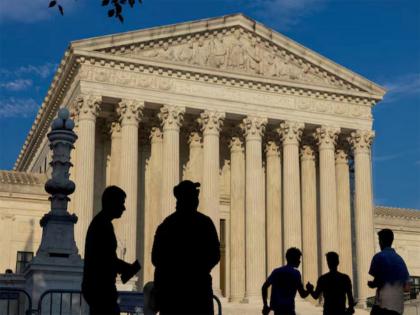US Supreme Court will decide the fate of Trump's tariff on Wednesday
By ANI | Updated: November 3, 2025 10:50 IST2025-11-03T10:45:58+5:302025-11-03T10:50:03+5:30
New Delhi [India], November 3 : The U.S. Supreme Court will hear a crucial case on November 5 that ...

US Supreme Court will decide the fate of Trump's tariff on Wednesday
New Delhi [India], November 3 : The U.S. Supreme Court will hear a crucial case on November 5 that could redefine presidential authority over trade and reshape global economic relations.
The case, Learning Resources Vs Trump, will decide whether a U.S. president can use emergency powers under the International Emergency Economic Powers Act (IEEPA) to impose tariffs without congressional approval.
The outcome could have sweeping implications for Donald Trump's "Liberation Day" tariffs and for global trade policy.
According to a note by the Global Trade Research Initiative (GTRI), if the Supreme Court rules against Trump, it could force the administration to withdraw tariffs imposed under IEEPA.
It stated "Such a ruling would mean all "Liberation Day" tariffsand subsequent rate hikeslack a lawful basis. The administration would have to roll them back or face injunctions halting their collection".
Trump could attempt to reimpose similar tariffs under Section 301 or Section 232, but those statutes require new investigations and public justification, delaying action and inviting further legal challenges.
GTRI noted that if the Supreme Court strikes down Trump's use of emergency powers, the ruling would reverberate far beyond U.S. borders.
The decision would unravel the foundation of several recently negotiated trade arrangements with key partners such as the European Union, Japan, South Korea, and the United Kingdom.
These agreements were struck under the shadow of those tariffs and were premised on reciprocal concessions.
It would also disrupt ongoing trade talks with India, where tariff leverage has shaped Washington's negotiating position.
The case is being closely watched not just in the U.S. but around the world, including in India. It is seen as a test of executive power and the constitutional separation of powers between the White House and Congress.
Two core legal questions are at the heart of the case.
The first is about jurisdiction, whether the case belongs in a federal district court or the Court of International Trade (CIT). The petitioners, led by Learning Resources, Inc., argue that their claims arise under IEEPA itself, not under any law "providing for tariffs," and therefore should be heard in a district court.
The government maintains that because the case challenges the tariff schedule, it properly falls under the CIT's jurisdiction.
The second and more consequential issue is whether IEEPA allows the president to impose tariffs at all.
The petitioners, represented by Akin Gump Strauss Hauer & Feld LLP, contend that the law's language permitting regulation of "importation or exportation" does not extend to setting customs duties, a power reserved for Congress.
They invoke the "major questions doctrine," arguing that allowing a president to declare economic emergencies and unilaterally set tariffs would upset the constitutional balance of powers.
Three lower courts have already ruled against the Trump administration.
The case was first heard in the U.S. District Court for the Northern District of Illinois, which on April 26, 2025, rejected the government's argument that IEEPA allowed broad tariff powers and referred the matter to the trade courts.
The U.S. Court of International Trade, in a June 14, 2025, decision, held that IEEPA does not authorize the president to levy general tariffs and that Trump's use of emergency powers for routine trade matters violated the Constitution's separation of powers.
The U.S. Court of Appeals for the Federal Circuit upheld that ruling on August 2, 2025, finding that Congress had never delegated such sweeping authority to the executive branch.
As the Supreme Court prepares to hear arguments, the world's attention will turn to Washington.
Disclaimer: This post has been auto-published from an agency feed without any modifications to the text and has not been reviewed by an editor
Open in app